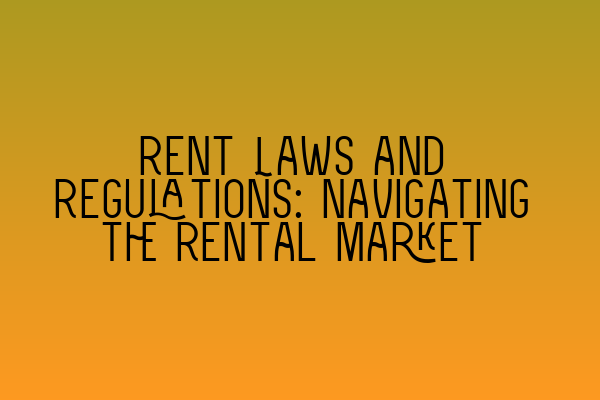Rent Laws and Regulations: Navigating the Rental Market
Are you a tenant or a landlord looking to understand the complexities of rent laws and regulations? Look no further! At SQE Property Law & Land Law, we specialize in helping individuals navigate the rental market with ease. In this blog post, we will provide you with a comprehensive guide to rent laws and regulations, ensuring that you are equipped with the knowledge you need to make informed decisions.
Before we dive into the details, it’s important to note that rent laws and regulations can vary from country to country and even from state to state or province to province. Therefore, it’s crucial to familiarize yourself with the specific laws that govern your area. Additionally, consulting with a qualified solicitor is always a wise decision to ensure that you are following the correct procedures and practices.
Let’s start by examining some key terms and concepts that are frequently encountered in the rental market:
1. Tenancy Agreement: A tenancy agreement is a legally binding contract between the tenant and the landlord. It outlines the terms and conditions of the tenancy, including the rent amount, payment frequency, duration of the tenancy, and any other obligations or rights of both parties. It is essential to have a clear and well-drafted tenancy agreement to avoid any potential disputes in the future.
2. Rent Control: Rent control refers to government-imposed limits on the amount of rent that landlords can charge. These limits are usually set to protect tenants from excessive rent increases. Rent control laws may vary depending on the jurisdiction, but they generally aim to maintain affordable housing options for tenants.
3. Security Deposit: A security deposit is a sum of money paid by the tenant to the landlord as a form of financial protection. It is typically held by the landlord for the duration of the tenancy and is often used to cover any damages caused by the tenant or to compensate for unpaid rent. It is important to note that the regulations surrounding security deposits can differ significantly, so understanding your rights and obligations as a landlord or tenant is crucial.
4. Eviction: Eviction is the legal process by which a landlord removes a tenant from the property. Evictions can be initiated for various reasons, including non-payment of rent, violation of the terms of the tenancy agreement, or when the landlord requires the property for personal use. It is essential to follow the correct procedures and adhere to the relevant laws when considering or carrying out an eviction.
Now that we’ve covered some fundamental concepts let’s discuss some common rent laws and regulations that tenants and landlords need to be aware of:
1. Fair Housing Laws: Fair housing laws aim to prevent discrimination in the rental market based on factors such as race, color, religion, sex, national origin, familial status, or disability. These laws ensure that all individuals have equal access to housing opportunities and address discriminatory practices in advertising, tenant screening, lease agreements, and evictions.
2. Rent Increase Regulations: Many jurisdictions have laws in place that restrict the frequency or amount of rent increases. It’s important to familiarize yourself with these regulations, as violating them can result in legal consequences or potential disputes with your tenants or landlord.
3. Repairs and Maintenance: Landlords have a legal responsibility to maintain the property in a safe and habitable condition. This includes addressing any repairs or maintenance issues in a timely manner. Tenants also have a role to play by promptly reporting any issues to the landlord. Understanding the repair and maintenance obligations is crucial for both parties to ensure a smooth tenancy.
4. Dispute Resolution: Disagreements between tenants and landlords can sometimes arise. In such instances, it’s important to know how to resolve these disputes effectively. Mediation or arbitration can be used as alternative methods to litigation, providing a quicker and less costly resolution. Familiarize yourself with the dispute resolution procedures in your jurisdiction to ensure a fair and efficient process.
5. Termination of Tenancy: Both tenants and landlords may have valid reasons for terminating a tenancy. However, it’s important to follow the correct procedures outlined in the tenancy agreement and the applicable laws. Tenants typically have a notice period within which they must provide notice of their intention to vacate the property, while landlords must provide a valid reason for terminating the tenancy.
As mentioned earlier, it is crucial to consult with a qualified solicitor to obtain precise advice tailored to your specific circumstances and location. At SQE Property Law & Land Law, our experienced team of solicitors can guide you through the intricacies of rent laws and regulations, ensuring that you are aware of your rights and obligations. With our expertise, you can confidently navigate the rental market and avoid any potential legal pitfalls.
For further resources and information on related topics, we recommend checking out the following articles:
– SQE 1 Practice Exam Questions: Test your knowledge and prepare for the SQE 1 exam with our practice exam questions.
– SQE 1 Practice Mocks FLK1 FLK2: Take advantage of our SQE 1 practice mocks to simulate the exam environment and enhance your preparation.
– SQE 2 Preparation Courses: If you are looking to pursue a career in property law or land law, our SQE 2 preparation courses can equip you with the necessary skills and knowledge.
– SQE 1 Preparation Courses: Prepare for the SQE 1 exam with our comprehensive preparation courses, designed to ensure your success.
– SRA SQE Exam Dates: Stay up-to-date with the latest SRA SQE exam dates and registration deadlines.
We hope this blog post has provided you with valuable insights into rent laws and regulations. Remember, being well-informed and seeking professional advice can save you both time and money in the long run. Feel free to contact us at SQE Property Law & Land Law for any further assistance.
